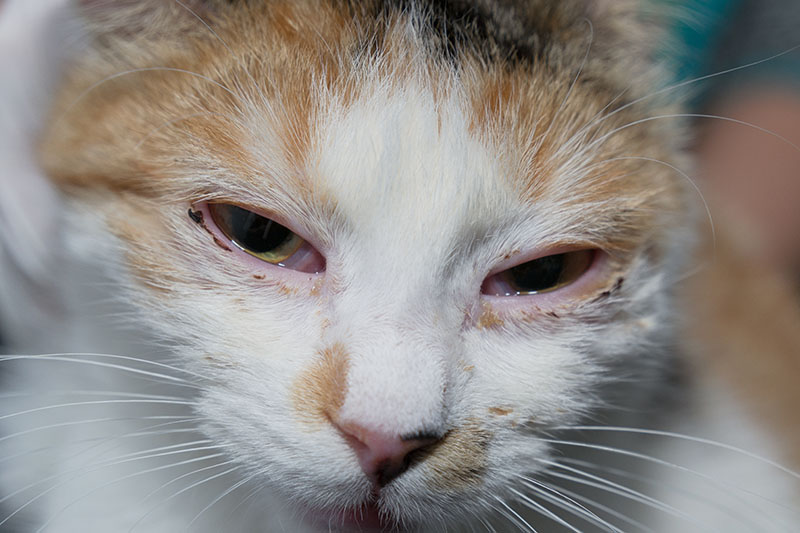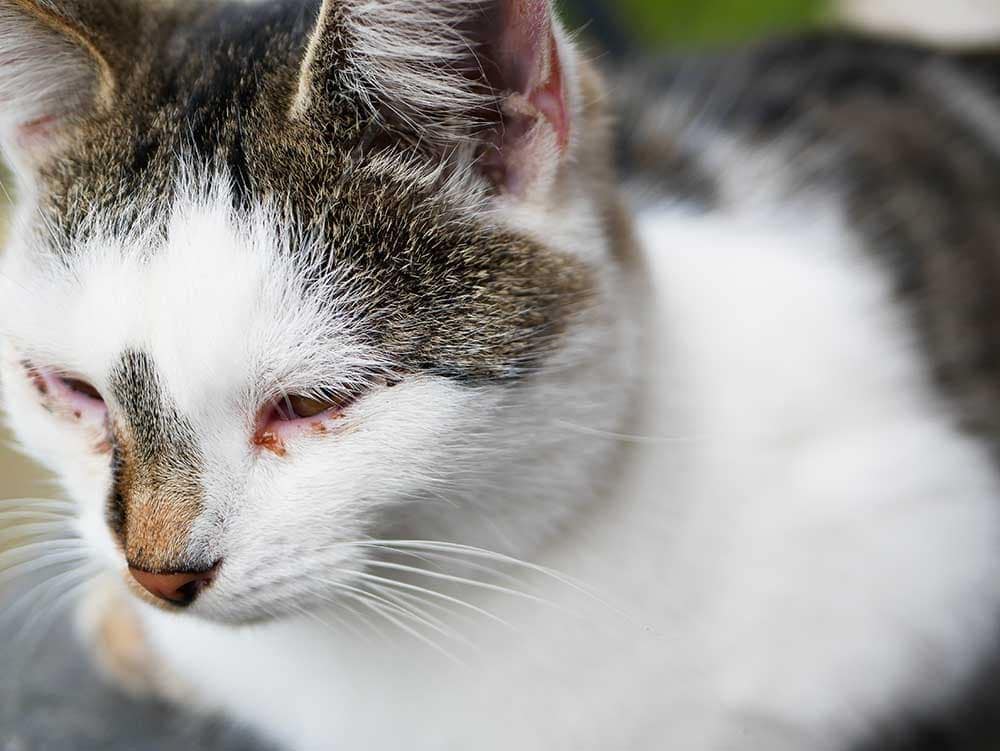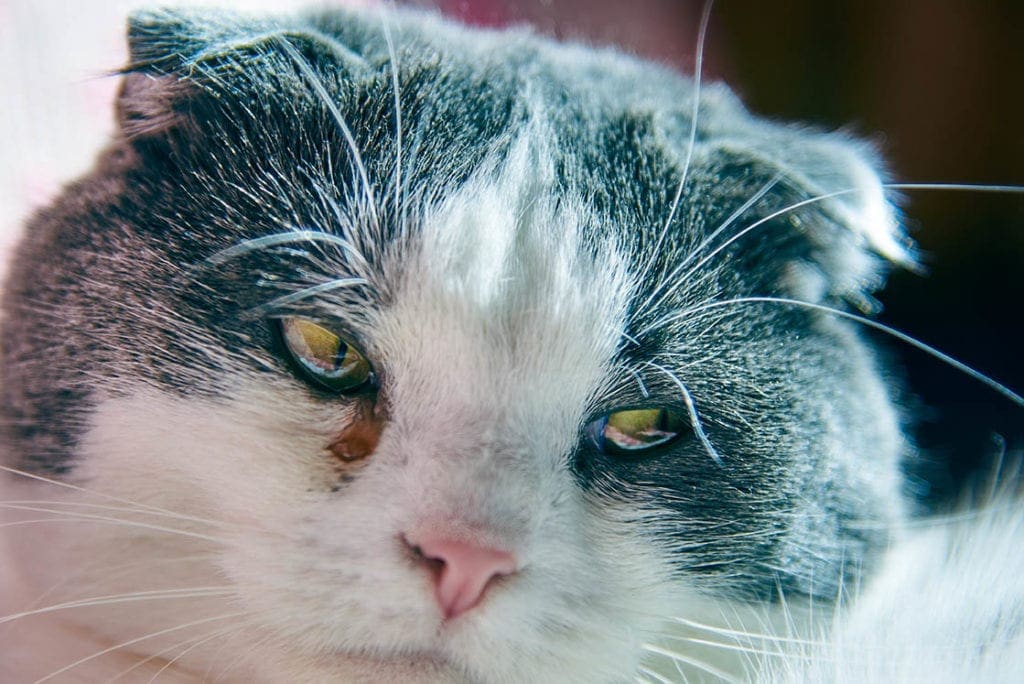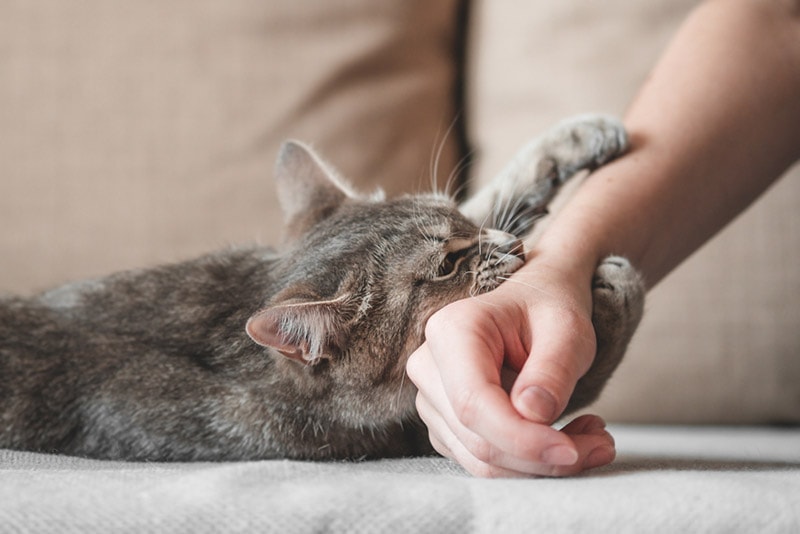How Do Cats Get Pink Eye (Conjunctivitis)? Vet Approved Facts & FAQ
Updated on

The first time you see your cat with the dreaded “pink eye,” you likely won’t ever forget it. Your poor cat will be tearing up like mad, may have a nasty discharge coming from their eyes, and will probably be squinting due to light sensitivity or pain. Cats get pink eye from various sources, including viruses, bacteria, dirt, allergies, entropion, and several more. Keep reading as we discuss pink eye and how to help your cat’s eyes stay clear, bright, and healthy.
What Is Pink Eye?
Cat eyes have several parts, including the third eyelid, eyelids, cornea, iris, lens, retina, and optic nerve. The third eyelid (also called nictitating membrane) is the triangular membrane that you can sometimes see in the inner corner of your cat’s eye. The conjunctiva is a transparent to pinkish layer that covers both the white part of your cat’s eyeballs and the inside of their eyelids and third eyelid. The conjunctiva protects your cat’s eyes from harm and plays a role in producing tears.
Conjunctivitis means inflammation of the conjunctiva. When functioning normally, your cat’s conjunctiva will be either too pale to see or very pale pink. When your cat has conjunctivitis, the conjunctiva will be especially pink or red, inflamed, and swollen. Conjunctivitis can affect one or both of your cat’s eyes, and so it is called unilateral or bilateral conjunctivitis. In most cases, pink eye in cats is treatable, although some cats may deal with the condition more often than others, especially cats with a feline herpes virus infection.
What Are the Signs of Pink Eye??
Several signs indicate that your cat has pink eye and most are easy to see. You will notice the change in color and your cat’s face will look like they have been crying.
- A watery discharge from one or both of your cat’s eyes. The discharge can be cloudy and vary from yellow to green.
- Your cat will squint or blink excessively.
- Your cat’s eyes will be badly swollen and, in severe cases, swollen shut.
- The eyes will be red and swollen, including the skin around them.
- Your cat might have a sensitivity to light.
- Your cat’s third eyelid will be more prominent.
- Your cat might be pawing at their face.

What Are the Causes of Pink Eye?
Pink eye is typically caused in one of two ways. The most common cause of pink eye in cats is infection, including viruses, bacteria and, much less commonly, fungi. The second most common cause is that your cat has a non-infectious condition that can include injuries, allergies, irritants, foreign bodies, eyelid problems and eye tumors. The good news is that most cases of pink eye are easy to treat, although certain types of infections are regrettably a problem that may come and go for a long time.
Eyes can work as a “window” to your cat’s body. Sometimes, pink eye is the first sign of a more worrying problem inside the eye or a “systemic problem” (a problem in your cat’s body). It is important to get help from your veterinarian if your cat’s eye is persistently pink so that they can examine your cat and make sure pink eye is not a manifestation of a more severe problem.
Infectious Causes of Pink Eye in Cats
Infectious causes of pink eye in cats can range from mild to severe regarding how they need to be treated.
- Feline herpes virus
- Feline Chlamydia (Chlamydophila felis)
- Mycoplasma
- Feline Calicivirus
- Secondary bacterial infections
Non-Infectious Causes of Pink Eye in Cats
Many things can cause your cat to have conjunctivitis; thankfully, most aren’t deadly or life-threatening.
- Injuries: Cat scratches, brambles or bushes can cause pink eye.
- Dust, sand, and plant materials: All three of these types of foreign objects can enter your cat’s eyes and cause pink eye.
- Eyelid problems: Eyelid lumps and turning-in of your cat’s eyelid (called entropion) can irritate your cat’s eye and manifest as pink eye.
- Exposure to irritants: Harsh chemicals, smoke, and air fresheners (if near enough to your cat’s eyes) can cause pink eye in your cat.
- Allergies: An over-reaction to certain substances (most commonly found in the environment) can cause allergic conjunctivitis in your cat.

How Do I Care for a Cat With Pink Eye?
It is important to get help from your vet as soon as you notice any changes to your cat’s eyes. It’s also worth noting that if your cat’s eyes are only watering a little more than usual and everything else seems normal, it’s likely that the tears are just trying to expel a piece of dirt or debris from your kitty’s eyes. Below are a few ways to help your cat deal with true conjunctivitis.
- Administer saline drops or an eye wash and use as directed by the package
- Use a medicated eye drop or ointment prescribed by a veterinarian to treat the specific problem
- Avoid self trauma using a protective collar
Remember that if left untreated, pink eye can seriously hurt or damage your cat’s eyes. In severe cases, your cat could even go blind. That’s especially true if the cause of the pink eye is an infection or scratch. If your cat’s condition does not improve or worsens, contact your vet immediately.
Frequently Asked Questions
Can Pink Eye in Cats Spread to Humans?
Although it is possible, it’s still highly unlikely your cat will spread pink eye to you or a member of your immediate family.
Can Pink Eyes in Cats Cause Blindness?
If left untreated, severe cases of conjunctivitis can affect your cat’s eye function to the point that your cat may go blind.
Which Cats Are More Susceptible to Pink Eye?
Kittens are the most at risk of contracting the infectious form of pink eye. This is because their immunity is still low, so kittens can’t yet fight the germs that can cause conjunctivitis. Short-nosed cat breeds such as Persians and Himalayans are more prone to pink eye related to entropion.
What Is the Most Common Cause of Conjunctivitis in Cats?
Infectious causes are the most common, and although specific numbers are hard to come by, conjunctivitis in cats seems to be caused by the herpes virus more than any other cause.
Can Other Pets Get Pink Eye From Cats?
Yes, other pets can “catch” conjunctivitis from your cat. If you know they have pink eye, you should keep your cat away from other pets until they are better.
Can I Prevent My Cat from Getting Pink Eye?
Yes, vaccinating your cat is an important measure for preventing or mitigating viral infections. Allergic pink eye can also be prevented by minimizing exposure to allergens. Your vet can help you with these strategies.
Final Thoughts
Cats get pink eye from various sources, including viruses, bacteria, dirt, allergies, entropion, and several more. In most cases, it’s rather straightforward to help a cat with pink eye to get better, but always contact your vet for help. If left untreated, pink eye can have serious consequences for your cat, so treating it as soon as you see the signs is highly recommended.
The good news is that, in most situations, your cat will recover quickly. Some cats, however, especially those with feline herpes, might get pink eye more often than others. Whatever the case with your cat, we hope the information we shared today has been helpful and answered all your important questions.
Featured Image Credit: Todorean-Gabriel, Shutterstock












